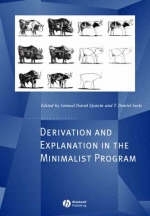
Derivation and Explanation in the Minimalist Program
Wiley-Blackwell (Verlag)
978-0-631-22733-5 (ISBN)
Derivation and Explanation in the Minimalist Program presents accessible, cutting edge research on an enduring and fundamental question confronting all linguistic inquiry – the respective roles of derivation and representation.
Presents accessible, cutting edge research on the respective roles of derivation and representation in syntactic inquiry.
Discusses a wide range of phenomena and also includes alternative, representational perspectives.
Features papers by M. Brody, C. Collins, S. Epstein, J. Frampton, S. Gutmann, N. Hornstein, R. Kayne, H. Kitahara, J. McCloskey, N. Richards, D. Seely, E. Torrego, J. Uriagereka, C.J.W. Zwart.
Samuel David Epstein is Associate Professor of Linguistics at the University of Michigan. He is co-founder of Syntax: A Journal of Theoretical, Experimental and Interdisciplinary Research and has published widely on syntactic theory. He is the author of Traces and Their Antecedents (1991); co-author of A Derivational Approach to Syntactic Relations (with E. Groat, R. Kawashima, and H. Kitahara, 1998); and co-editor of Working Minimalism (with N. Hornstein, 1999). T. Daniel Seely is Associate Professor of Linguistics at Eastern Michigan University. His work on syntactic theory has appeared in journals such as Linguistic Inquiry and Word, and he is a former moderator of The Linguist List.
1. Introduction: Derivation and explanation: Samuel David Epstein & T. Daniel Seely. 2. On the status of representations and derivations: Michael Brody.
3. Eliminating Labels: Chris Collins.
4. Rule applications as cycles in a level-free syntax: Samuel David Epstein & T. Daniel Seely.
5. Crash-proof syntax: John Frampton & Samuel Gutmann.
6. Reprojections: Norbert Hornstein & Juan Uriagereka.
7. Pronouns and their antecedents: Richard Kayne.
8. Scrambling, Case, and Interpretability: Hisatsugu Kitahara.
9. Resumption, successive cyclicity, and the locality of operations: James McCloskey.
10. Movement in a top-down derivation: Norvin Richards.
11. Arguments for a Derivational approach to syntactic relations based on clitics: Esther Torrego.
12. Issues relating to a derivational theory of binding: Jan-Wouter Zwart.
| Erscheint lt. Verlag | 1.11.2002 |
|---|---|
| Reihe/Serie | Generative Syntax |
| Verlagsort | Hoboken |
| Sprache | englisch |
| Maße | 172 x 246 mm |
| Gewicht | 599 g |
| Themenwelt | Geisteswissenschaften ► Philosophie ► Sprachphilosophie |
| Geisteswissenschaften ► Sprach- / Literaturwissenschaft ► Sprachwissenschaft | |
| ISBN-10 | 0-631-22733-4 / 0631227334 |
| ISBN-13 | 978-0-631-22733-5 / 9780631227335 |
| Zustand | Neuware |
| Haben Sie eine Frage zum Produkt? |
aus dem Bereich


